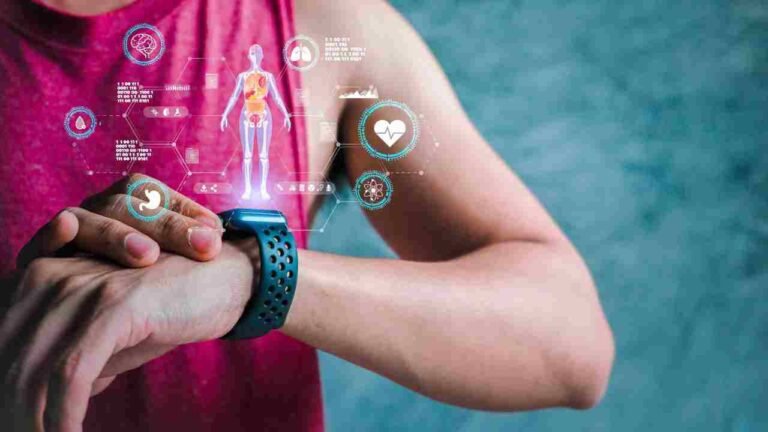1. The Role of Wearable Tech in Modern Wellness
Wearable tech has transformed how we monitor and manage our health, and in recent years, it has become a crucial tool in promoting better wellness and managing stress. From tracking daily physical activity to monitoring stress levels and providing insights for relaxation, wearables are revolutionizing how we take care of our mental and physical well-being. In this article, we explore how wearable tech can empower you to take control of your wellness and stress management.
2. Continuous Health Monitoring: The Foundation of Wellness
Wearables like the Apple Watch Series 9 and Fitbit Sense provide real-time monitoring of key health metrics such as heart rate, activity levels, sleep quality, and even blood oxygen saturation. These devices offer continuous feedback, helping users stay on top of their health and make informed decisions about their well-being. By understanding patterns in their daily habits, wearables help users make lifestyle changes that contribute to overall wellness.
Key Features:
- Continuous heart rate and activity tracking
- Sleep tracking for better rest and recovery
- Blood oxygen and ECG monitoring for deeper insights
3. Stress Monitoring: Wearable Tech for Mental Well-Being
Wearable devices are increasingly being equipped with sensors that monitor stress levels, helping individuals better understand the triggers that affect their mental health. Devices like the Whoop Strap 4.0 and Garmin Venu 3 use heart rate variability (HRV) to assess stress levels and provide actionable feedback. By tracking HRV, wearables can help users detect signs of stress and take steps to manage it before it becomes overwhelming.
Key Features:
- Heart rate variability (HRV) for stress monitoring
- Real-time stress feedback and alerts
- Integration with relaxation apps for managing stress
4. Guided Breathing and Relaxation Exercises
Many wearables offer built-in relaxation tools, such as guided breathing exercises, that help users manage stress in real-time. Devices like the Fitbit Charge 6 and Apple Watch provide breathing prompts and relaxation reminders throughout the day. These exercises can lower your heart rate, calm your mind, and help you return to a state of relaxation, making it easier to deal with stressful situations effectively.
Key Features:
- Guided breathing exercises for relaxation
- Personalized stress reduction recommendations
- Real-time alerts to remind users to relax
5. Sleep Tracking: The Key to Stress Reduction
Quality sleep is vital for maintaining overall health and managing stress, and wearables have become instrumental in tracking sleep cycles. Devices like the Oura Ring and Withings Sleep monitor your sleep stages, including deep, light, and REM sleep, and offer insights into how to improve sleep quality. Better sleep leads to better recovery and helps reduce stress, making wearables an excellent tool for wellness management.
Key Features:
- Sleep cycle tracking and analysis
- Insights on sleep quality and recovery
- Personalized sleep improvement tips
6. Activity Tracking: Enhancing Physical Wellness
Wearables are designed to keep users active and motivated by tracking daily steps, calories burned, and exercise intensity. Devices such as the Garmin Forerunner 945 and Samsung Galaxy Watch 6 help users set fitness goals, track progress, and encourage daily movement. Regular physical activity is known to reduce stress and improve overall wellness, making fitness tracking an essential part of a balanced lifestyle.
Key Features:
- Daily step and calorie tracking
- Exercise tracking for a variety of activities
- Personalized fitness goals and achievements
7. Mental Wellness and Mindfulness Integration
Many wearables now integrate with mindfulness and mental wellness apps, encouraging users to incorporate mental health practices into their daily routines. Apps like Calm and Headspace are available on many smartwatches, providing guided meditations, mindfulness exercises, and sleep aids. These integrations allow users to take a holistic approach to wellness by focusing on both physical and mental health.
Key Features:
- Integration with mindfulness and meditation apps
- Guided meditation and mental wellness exercises
- Sleep aids and stress reduction tools
8. Real-Time Feedback for Health Optimization
Wearables offer more than just data—they provide actionable insights. Many devices use AI and machine learning algorithms to analyze health data and suggest actionable steps for better stress management and wellness. The Oura Ring and WHOOP Strap analyze patterns in sleep, activity, and stress, providing personalized recommendations to help users optimize their health and well-being.
Key Features:
- AI-driven insights and wellness suggestions
- Personalized health recommendations based on user data
- Real-time feedback for stress and wellness optimization
9. Wearables for Emotional Well-Being: Tracking Mood and Emotions
Some wearable devices are now being developed to track mood and emotions, providing deeper insights into emotional well-being. Moodbeam is one such device that allows users to track their emotional states throughout the day. By understanding patterns in mood and emotion, users can identify the factors that contribute to stress and take steps to manage them effectively.
Key Features:
- Mood and emotion tracking throughout the day
- Integration with mental wellness apps
- Real-time emotional feedback for self-awareness
10. Future of Wearables in Wellness and Stress Management
As technology continues to evolve, the role of wearables in wellness and stress management will expand. In the future, we can expect wearables with even more advanced sensors, real-time biometric monitoring, and deeper integration with mental health platforms. Wearables could soon offer predictive insights, alerting users to potential stress triggers or health risks before they arise, helping to prevent chronic stress and improve long-term wellness.
Key Features:
- Predictive health insights for stress prevention
- Advanced sensors for real-time biometric data
- Integration with next-gen wellness and mental health apps
Conclusion
Wearable technology is fundamentally changing the way we approach wellness and stress management. With continuous monitoring, real-time feedback, and advanced sensors, wearables help users understand and manage their physical and mental health. As wearables continue to evolve, they will become even more integral to daily wellness routines, empowering users to optimize their health, manage stress, and lead more balanced, fulfilling lives.

